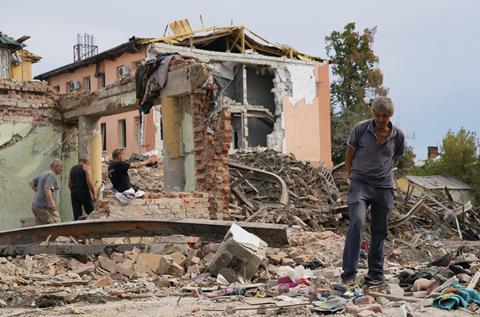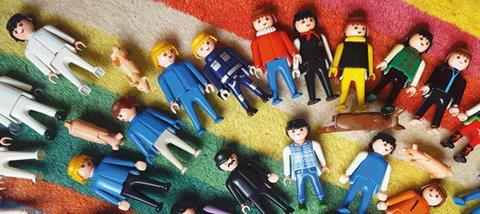Kate Orson has biblical wisdom and practical ideas for Christian parents worried about their children hearing the news

The news isn’t easy for anyone to hear right now, least of all our children. From war and political divisions, to natural disasters, the headlines are enough to fill a grown adult with terror, let alone a young person.
How can we talk to our children about the news, and ensure that they know that despite all the darkness, God is working all things together for good?
Help yourself first, then you can help your children
Firstly, I think it helps to put on our own oxygen mask. A number of research studies have found that watching the news has a negative effect on mental health. A 2007 study published in the International Journal of Behavioural Medicine found that watching just 15 minutes of news increased anxiety.
How do we balance being informed with taking care of our own mental health? This is something we need to think about and pray about. As we notice our own mental state, we can adjust what we are doing, so that when our children are distressed by world events, we can talk to them from a place of calm. Mirror neurons in the brain mean that our children can pick up on our mood and reflect it. Therefore, if we are less anxious about world events, we can reassure them and help them feel better.
Understand the world and understand your child
Understanding what is going on in the world can help children to develop empathy and compassion, but ideally this needs to happen in an age-appropriate way. Children below the age of 13 will have difficulty processing the news, as their developing minds just aren’t ready to take on such heavy themes.
Nevertheless, children of any age are bound to pick up snippets about current events, even if we do shield them from it. Talking about news is helpful as we know our children best so we can communicate the information in a way that suits them. We can allay any fears they have or correct any misconceptions they’ve picked up.
So, what’s the best way to do this?
Be proactive
If there’s an event that everyone’s talking about, that you know your children will have heard about, then it can be helpful to bring it up, and give them a chance to ask any questions, though it’s best not to share more information than they ask for.
For younger children the world may seem much smaller than it is; they may fear wars, or earthquakes even if they’re in no immediate risk. We can correct misconceptions like this and reassure them that they are safe.
Bring it back to God
The news can evoke all sorts of feelings. Children may pick up on the sense that the world is falling apart and that they are helpless to do anything. It can lead to questions about God, that even adults struggle with such as why would God allow such suffering?
News events can be an opportunity to talk about Jesus, the free will he gives us, and God’s plan to save humanity. We can pray for those who are suffering around the world and empower children to see prayer as a way to overcome feelings of helplessness.
do not be anxious about anything, but in everything by prayer and supplication with thanksgiving let your requests be made known to God. And the peace of God, which surpasses all understanding, will guard your hearts and your minds in Christ Jesus. - Philippians 4:6-7
Respond practically
On the news we see a lot of events in faraway places that we can do nothing to solve. Bringing it back to what we can do helps. Perhaps there is a church outreach or local charity you can support. Involving children in taking action helps to turn away the focus from what they can’t change towards what they can do.
The significance of play
One thing to bear in mind is that children won’t always be able to express their feelings about what they’ve heard in words. Play is a natural process that children use to make sense of the world around them. For example, when my daughter was four, we flew on a plane to Scotland, and there was bad weather. We ended up having a very bumpy landing. After that she loved to play putting all her stuffed toys on an aeroplane and then having a bumpy landing. The toys would fall to the floor and she would laugh and laugh. Laughter is actually a natural way to release fear and feel better. When we laugh endorphins are released which decrease stress and increase our sense of wellbeing.

One way to help our child’s emotional health (and also their behaviour!) is to set up playtimes with them. Tell your child it’s ‘special time’ and set a timer for 10-15 minutes and tell them they can play anything they like. Make sure you give your child your full attention and do whatever they choose. If you notice there’s something that makes your child laugh, then repeating it can help them process whatever fear has been bothering them.
Doing regular ‘special times’ can help build up a sense of trust, that your child feels like they have a safe space to bring up feelings that lie deep within, often beyond words.
If you have concerns that your child has been affected by something on the news then you may see them act out what they’ve heard in role play with Lego, or stuffed toys etc. Getting involved and playing with your child, picking up on what makes them laugh can offer reassurance in a way that speaks their language.
The broken-coookie phenomenon
Another aspect of non-verbal expression of feelings is through tears, and tantrums. The psychologist Aletha Solter coined the term ‘the broken-cookie phenomenon’ to explain why sometimes children have a big cry over something as small as a broken cookie.
Children, especially younger ones, will often pick a small event as an opportunity to offload stress and upset about bigger things. Tears have been found to contain cortisol, so they are a way of releasing stress. It’s all part of their God-given ability to heal and recover from difficult experiences.
This can often happen when your child senses you have the ability to listen. So, when the tears come, don’t rush to distract, or make things better right away, instead, just offer them a hug, gently empathising, and listening. In these moments, there’s no need to try to get children to verbalise what’s going on emotionally. Sometimes they don’t actually need to find the words, but instead just let the upset out.
Turning to the Bible for help
Here are some Bible verses that could be shared with our children when discussing the news:
Even though I walk through the darkest valley, I will fear no evil, for you are with me; your rod and your staff, they comfort me. Psalm 23.4
Fret not yourself because of evildoers; be not envious of wrongdoers! For they will soon fade like the grass and wither like the green herb. Psalm 37:1-2
If God is for us, who can be against us? - Romans 8.31
do not be anxious about anything, but in everything by prayer and supplication with thanksgiving let your requests be made known to God. And the peace of God, which surpasses all understanding, will guard your hearts and your minds in Christ Jesus. - Philippians 4:6-7
He will wipe away every tear from their eyes, and death shall be no more, neither shall there be mourning, nor crying, nor pain anymore, for the former things have passed away.” Revelation 21.4










































